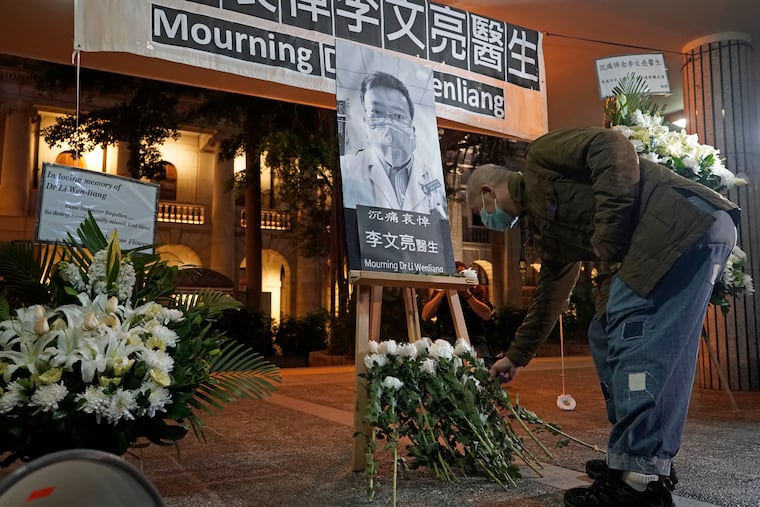Coronavirus death of Chinese whistle-blower doctor should sober Beijing — and us | Trudy Rubin
The death of Chinese doctor Li Wenliang, who blew the whistle on the coronavirus, illustrates Beijing's failures, but Chinese support for his heroism should win sympathy abroad.

The death of a young Chinese doctor who was silenced by authorities when he tried to warn about the outbreak of the coronavirus has lit up the country’s social media with outrage.
By Friday, references to the death of whistle-blower Li Wenliang from the virus had been viewed 270 million times on Weibo, one of the biggest social media platforms in China. The public is so angry that Chinese censors haven’t yet shut the topic down.
This 34-year-old ophthalmologist from Wuhan, who left behind a young child and pregnant wife, has become the face of the epidemic, and of Beijing’s blunders.
» READ MORE: Coronavirus hasn’t reached Philly. But fear and racism are spreading.
Back in December, he posted his concerns about a contagious new virus that resembled SARS, the lethal coronavirus that spread to 29 countries in 2003. He was arrested, jailed, and made to recant. Now he has become a martyr for millions of Chinese.
But his death is far more than a poignant tragedy. It is an indictment of China’s tightly controlled top-down system that silences civil society and independent media. Had his warnings been heeded in December, this outbreak might never have exploded into a global health emergency.
And Li’s bravery – along with the outrage of millions of Chinese – is a reminder that, whatever the tensions between China and the United States, the Chinese people are as much a victim of their government’s failure as the still small number who have been infected globally.
We should all mourn Li Wenliang. And so should Xi Jinping’s government in Beijing.
But of course it will not.
“There is a strong parallel between the response and cover-up to SARS and this current outbreak,” I was told by the Council on Foreign Relations’ Yanzhong Huang, a global health expert specializing in China. Although the first case was apparently detected on Dec. 12, local officials hid the statistics for weeks, fearful of falling afoul of Communist Party higher-ups by reporting anything that undermined “stability.”
Had Li Wenliang’s warnings been heeded in December this outbreak might never have exploded into a global health emergency.
“This is exactly why Dr. Li has become the subject of national grief,” Huang continued. “He was a whistle-blower, who gathered information. It would have been a different story if they listened to him. There is a strong incentive at the local level to silence dissenting voices.”
We have seen the results. Yes, Xi Jinping’s authoritarian rule does well at top-down physical commands – building new hospitals in Wuhan in 10 days and quarantining the entire city. But the crackdown on nongovernmental organizations in the health field (and beyond) and muzzling of independent media cut the central government off from vitally needed information.
“The lessons of SARS haven’t been learned, in terms of information transparency,” says sociologist Anthony Spires, a China expert at the University of Melbourne. “Without civil society input and a freer press that could raise red flags, the government is disadvantaged in reporting outbreaks. They should know that.”
What’s so disturbing is that many Chinese officials do know that, but it doesn’t seem to make a difference. In 2010, I interviewed then-Chinese Health Minister Chen Zhu in Beijing along with a small group of U.S. journalists. “SARS has taught us a very good lesson,” he said. "Now we emphasize information transparency and immediate disclosure.
“We are establishing a system that allows the grass roots to respond directly to the Ministry of Health," he went on. "NGOs have an indispensable role in health care, in particular in the prevention of diseases.”
» READ MORE: Talk of a new cold war between US and China is misleading I Trudy Rubin
I don’t know whether Chen ever followed through on those plans. However, under Xi Jinping, top-down controls have become even tighter. “One clear target of Xi’s groups to silence are domestic NGOs in the health field," says Sophie Richardson, China director of Human Rights Watch, "including groups that provide services and information to the public or help respond to medical crises.”
So the question at hand is whether the Beijing government will learn anything from the current crisis about the need for bottom-up information from civil society. So far it looks unlikely.
“We have declared a people’s war against the epidemic,” Xi told President Donald Trump by phone. The phrase people’s war means top-down control and ignoring the grass roots.
This is a self-defeating strategy for China. Beijing’s proven inability to prevent epidemics will only embolden those U.S. officials with an unrealistic view of how far America’s economy and society can be “decoupled” from China.
Beijing’s initial mishandling of the outbreak is also triggering a fear factor that feeds xenophobia. Fortunately, the evidence so far indicates that the current coronavirus epidemic is much less lethal than SARS and limited globally.
But hats off to Mayor Jim Kenney for visiting Philadelphia’s Chinatown and pushing back against coronavirus hysteria. Any attacks against Chinese nationals or Asian Americans, or gleeful celebration of the epidemic’s impact on China’s economy (as in Commerce Secretary Wilbur Ross’ comment that it may bring jobs back to America), are sickening.
» READ MORE: Philadelphia Mayor Jim Kenney dined in Chinatown to calm fears of the coronavirus
» READ MORE: I didn’t want to write about coronavirus and racism. Then I got harassed twice. | Perspective
We should all take a moment to pay our respects to Li Wenliang, who reminded us that China is made up of individuals, some heroic, many seeking to make their society more transparent, and millions now suffering from their government’s failure. The problem lies with Beijing.